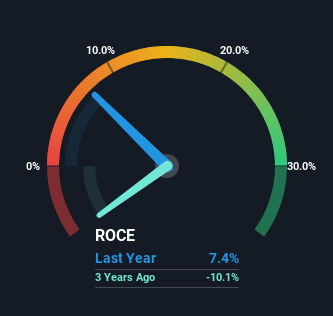- United States
- /
- Interactive Media and Services
- /
- NasdaqGS:TRIP
Tripadvisor's (NASDAQ:TRIP) Returns On Capital Not Reflecting Well On The Business
What underlying fundamental trends can indicate that a company might be in decline? A business that's potentially in decline often shows two trends, a return on capital employed (ROCE) that's declining, and a base of capital employed that's also declining. This indicates to us that the business is not only shrinking the size of its net assets, but its returns are falling as well. On that note, looking into Tripadvisor (NASDAQ:TRIP), we weren't too upbeat about how things were going.
What Is Return On Capital Employed (ROCE)?
If you haven't worked with ROCE before, it measures the 'return' (pre-tax profit) a company generates from capital employed in its business. To calculate this metric for Tripadvisor, this is the formula:
Return on Capital Employed = Earnings Before Interest and Tax (EBIT) ÷ (Total Assets - Current Liabilities)
0.074 = US$144m ÷ (US$2.7b - US$792m) (Based on the trailing twelve months to September 2024).
Therefore, Tripadvisor has an ROCE of 7.4%. Even though it's in line with the industry average of 6.8%, it's still a low return by itself.
See our latest analysis for Tripadvisor

Above you can see how the current ROCE for Tripadvisor compares to its prior returns on capital, but there's only so much you can tell from the past. If you're interested, you can view the analysts predictions in our free analyst report for Tripadvisor .
What Does the ROCE Trend For Tripadvisor Tell Us?
We are a bit worried about the trend of returns on capital at Tripadvisor. About five years ago, returns on capital were 9.6%, however they're now substantially lower than that as we saw above. And on the capital employed front, the business is utilizing roughly the same amount of capital as it was back then. This combination can be indicative of a mature business that still has areas to deploy capital, but the returns received aren't as high due potentially to new competition or smaller margins. So because these trends aren't typically conducive to creating a multi-bagger, we wouldn't hold our breath on Tripadvisor becoming one if things continue as they have.
On a side note, Tripadvisor's current liabilities have increased over the last five years to 29% of total assets, effectively distorting the ROCE to some degree. If current liabilities hadn't increased as much as they did, the ROCE could actually be even lower. Keep an eye on this ratio, because the business could encounter some new risks if this metric gets too high.
Our Take On Tripadvisor's ROCE
In summary, it's unfortunate that Tripadvisor is generating lower returns from the same amount of capital. Long term shareholders who've owned the stock over the last five years have experienced a 52% depreciation in their investment, so it appears the market might not like these trends either. That being the case, unless the underlying trends revert to a more positive trajectory, we'd consider looking elsewhere.
While Tripadvisor doesn't shine too bright in this respect, it's still worth seeing if the company is trading at attractive prices. You can find that out with our FREE intrinsic value estimation for TRIP on our platform.
If you want to search for solid companies with great earnings, check out this free list of companies with good balance sheets and impressive returns on equity.
Valuation is complex, but we're here to simplify it.
Discover if Tripadvisor might be undervalued or overvalued with our detailed analysis, featuring fair value estimates, potential risks, dividends, insider trades, and its financial condition.
Access Free AnalysisHave feedback on this article? Concerned about the content? Get in touch with us directly. Alternatively, email editorial-team (at) simplywallst.com.
This article by Simply Wall St is general in nature. We provide commentary based on historical data and analyst forecasts only using an unbiased methodology and our articles are not intended to be financial advice. It does not constitute a recommendation to buy or sell any stock, and does not take account of your objectives, or your financial situation. We aim to bring you long-term focused analysis driven by fundamental data. Note that our analysis may not factor in the latest price-sensitive company announcements or qualitative material. Simply Wall St has no position in any stocks mentioned.
About NasdaqGS:TRIP
Tripadvisor
TripAdvisor, Inc., an online travel company, engages in the provision of travel guidance products and services worldwide.
Excellent balance sheet with reasonable growth potential.
Similar Companies
Market Insights
Community Narratives



